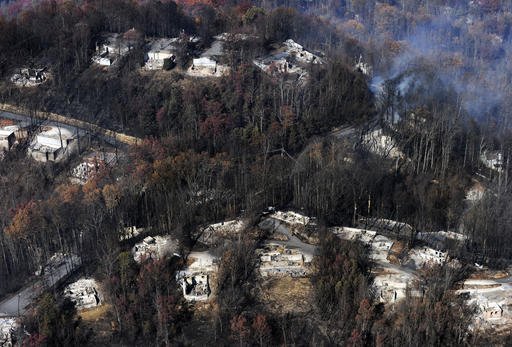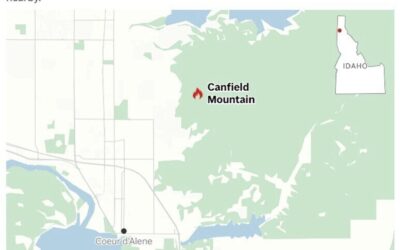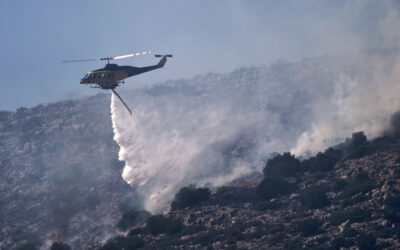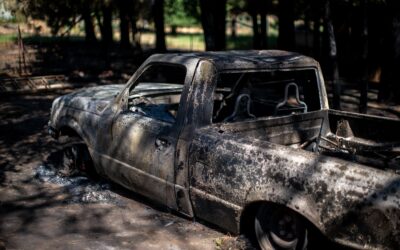Struggles to cope among first responders and survivors

In this Tuesday, Nov. 29, 2016, file photo, smoke rises from destroyed homes, many burned down to the foundation, the day after a wildfire that hit Gatlinburg, Tenn. Experts said that escaping a fire-filled forest, as thousands did Nov. 28 in the Great Smoky Mountains, can be more traumatic than disasters such as hurricanes, floods or earthquakes. One reason: Flames that scorched neighborhoods in the Gatlinburg, Tenn., area spread so rapidly that people had no time to brace for it. (Paul Efird/Knoxville News Sentinel via AP, File)
JEFF MARTIN, Associated Press
ATLANTA (AP) – When U.S. Forest Ranger Jody Bandy confronted the man in the Pisgah National Forest, he said he’d been at the nearby wildfire and “couldn’t take it anymore.”
Then he ran from the officer, tumbling head-over-head down the mountainside, into the river below and slamming into boulders in the water, Bandy said in a court affidavit.
After an ambulance took the bleeding man to a hospital, Bandy peered through the front windshield of his pickup and saw what appeared to be a suicide note on the dash, the affidavit says.
The Nov. 19 encounter in western North Carolina underscores the toll these wildfires can take on people who live through them.
Many survivors need help to cope, and signs of problems such as nightmares, depression and anxiety might not show up for months, said Valerie Cole of the American Red Cross. In some ways, escaping a fire-filled forest as thousands did recently in and around Gatlinburg, Tennessee, can be more traumatic than hurricanes, floods or earthquakes, experts say. One reason: Flames spread so rapidly that people had no time to prepare.
“To have your life turned upside down is much more difficult than if you had time to brace for it, and in this case I don’t think people had time to brace for it,” said Becky Stoll, vice president of crisis and disaster management at Centerstone, one of the nation’s largest behavioral health care providers.
Then, as residents raced from the woods, they saw orange and red ribbons of fire draped over homes, rolling across mountains.
“If you can see the flames nearby, that’s going to be a visual image that’s going to stay with you,” said Cole, who helped victims of a devastating 2011 wildfire in Alberta, Canada. Those kinds of images may have long-term consequences, she said.
Until Nov. 28, people in and around Gatlinburg went about their daily lives, even as the wildfire burned several miles away in the Great Smoky Mountains National Park. Then, in one night, everything changed.
“All of the sudden, it’s gone. You can’t go home. Your home’s not there. Your car may not be there. Your health may not be there,” said Marie Williams, commissioner of the Tennessee Department of Mental Health and Substance Abuse Services.
After an earthquake or even a tornado, survivors can often salvage a few things from damaged homes. “But when it has burned, and there are only ashes left, you can’t,” Cole said.
In the first few days after a disaster, survivors often go into operational mode and focus on basic needs, “so that kind of carries people for a few days,” Stoll said. People tend to be thankful they’re alive and grateful for help putting their lives back together, Cole said.
“Later on â- six months, nine months down the road - that’s when people get pretty frustrated, disillusioned,” said Cole, who saw this process unfold as she worked with wildfire survivors in Slave Lake, Alberta, slightly larger than Gatlinburg.
In May 2011 strong winds from a northern Canadian wildfire suddenly sent flames into Slave Lake, forcing nearly 7,000 people to flee on roads sometimes blocked by smoke and fast-moving fire.
“The town was basically destroyed, so there was a lot of rebuilding that was going on, but it was taking forever,” Cole recalled.
“People were starting to fight with each other,” she said. “People were depressed, anxiety levels were high … That will show up six to nine months later.”
Experts also know that suicide rates increase after disasters.
“People might have post-traumatic stress, symptoms like anger, substance abuse, hopelessness,” Williams said. “All these reactions are normal.”
After the forest ranger’s encounter with the distraught man from Hendersonville, North Carolina, he was charged in federal court with threatening, intimidating, resisting or interfering with a forest officer, and with driving while impaired.
He eventually surrendered to Bandy but was bleeding profusely from a head wound, court records show. Bandy arrived at the hospital later and asked to speak with the man. He told Bandy he had planned to end his life with a knife, but the ranger had startled him.
In his sworn affidavit, Bandy wrote that as the two spoke, the man told him: “You saved my life.”
Copyright 2016 The Associated Press. All rights reserved. This material may not be published, broadcast, rewritten or redistributed.




